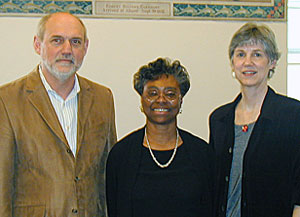|
|
Campus News
Inequality
in Crime across Place: Exploring the Role
of Segregation
by Jenifer Kish (May
6, 2005)
 |
From left,
Alan J. Lizotte, executive director,
the Hindelang Center, Ruth D. Peterson,
Ph.D., and School of Criminal Justice
Dean Julie Horney. |
Ruth D. Peterson, Ph.D., professor of sociology
and director of the Criminal Justice Research
Center at Ohio State University, focused on
the effect of segregation on patterns of crime
at this year’s Michael J. Hindelang lecture
April 7 in Milne Hall.
Peterson’s presentation was based on
her research of community conditions and crime,
racial and ethnic inequality in crime patterns,
and the consequences of criminal justice policies
for racially and ethnically distinct communities.
Peterson and colleague Lauren J. Krivo are
developing the National Neighborhood Crime
Study, a study of crime across neighborhoods,
sentencing patterns, the effects of capital
punishment, and racial patterning of crime.
In 1993, they published “Racial Residential
Segregation and Black Urban Homicide,” which
detailed findings that segregation has a strong
effect on black homicide. This research piqued
their curiosity about segregation and its effects.
Peterson’s current research focuses
on examining the determinants of race and ethnic
differences in violent crime rates. She has
also conducted research on criminal justice
decision-making, and capital punishment and
deterrence.
Widely published in many criminal justice
and sociology journals, including the American
Sociological Review, Social Forces, Social
Problems, Criminology, and the Journal
of Research in Crime and Delinquency, Peterson is a fellow of the
American Society of Criminology, and a recipient
of the society’s Herbert Bloch Award.
The lecture was hosted by the Hindelang Criminal
Justice Research Center. The center, founded
in 1972 by UAlbany Criminal Justice Professor
Michael J. Hindelang, conducts quality research,
develops policy recommendations in criminal justice,
disseminates research results through publication
in scholarly journals, sponsors brown bag lunches
and other colloquia, and provides opportunities
for graduate students to learn research skills
and to develop dissertation topics.
|
|
